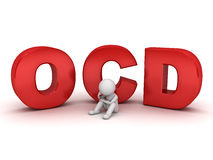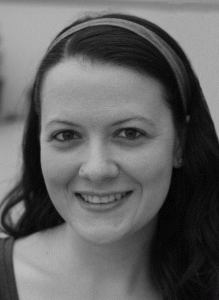Editor and Founder Vrinda Pendred discusses the news, negativity, and OCD
I think we can all agree that it’s been a pretty crazy year – a year that the news / media have recorded meticulously, one way or another, to ensure that we can’t get away from what’s happening. As someone with OCD, I have found this especially hard – but not as hard as some others will have found it, and that is what I’d like to talk about this month.
Bad News
When I was a child, from a very young age my English teachers would make us read local newspapers, cut out articles of interest and paste these into our notebooks. Then we had to annotate the articles and present them as ‘news broadcasts’ for the rest of our class. I found one such notebook in the loft, a few years back. Every article had the date included, so I could calculate how old I was. At the age of eight, I was reading about lethal injection, politicians having illicit affairs, and mothers killing their children. I like to think we can all agree that this was wholly inappropriate reading material for a class of eight-year-olds. And yet it was a standard part of the curriculum at the time – and we repeated the exercise every year until I was fourteen.
As I grew older, these news stories affected me more and more. I tried to minimise the damage by focusing on the Weather section, but all these stories were about people losing their homes or lives to natural disasters. I finally told my mother what was going on (I wish I’d thought to tell her sooner!) and she rang the school to have me excused from these ‘current events’ tasks. I was the only student who didn’t participate. I felt ‘outside’, like a ‘weirdo’…for not wanting to discuss rape and murder at the tender age of thirteen.
By this age, I was already aware that the only news that ever seems to get reported is bad news – very, very bad news. And nothing has made that clearer to me than this last year. I’m not saying that COVID-19 isn’t real. I don’t want to get political about the subject, whatever your views might be. What I am saying is that we need to think about the way such things are reported – and how those reports affect us, especially if we already struggle with anxiety.
Fear Sells
In the earliest months of COVID-19, I recall that every time I walked past the giant TV in the Reception waiting room at my office, all I would see was a death count ticker emblazoned across the screen. I’m sorry to say that the way many people reported it or discussed it online, it felt as if people were almost excited to see just how bad things could get – like it was a thrill to be part of something that big, that historical. And the mainstream media feed off that feeling. It’s how they make their money. Fear became a pandemic in itself.
For the first time in history, constant hand-washing and use of sanitiser was suddenly government guidance – a rule, even, if you wanted to enter a supermarket or go to school. And setting aside any public debates over the necessity of such rules, I couldn’t help but think: what of all the people officially diagnosed with OCD who had spent years on medication or in therapy to try to train themselves out of such behaviour? I can only imagine how confusing this last year must have been for those people.
It is my opinion that no matter how bad things get, the media should not be allowed to make money off of stirring up people’s deepest fears. Even if there are things we need to know for our own safety, I don’t see how broadcasting a live, up-to-date rising death count helps anyone. It doesn’t protect anyone from viral transmission. It simply puts people into a state of distress (which, by the way, weakens the immune system). And for those of us who live in a fairly constant state of anxiety anyway, that distress is magnified that much more.
But this fear mongering didn’t begin with COVID-19. To give a personal example, after my first son was born it seemed that every single news headline was about babies and toddlers dying in horrific ways. It had probably always been like that, but I didn’t notice it until it became relevant to my life. It hit me that this is what all parents have to face every day – headlines like that. It’s awful for anyone, but as someone with OCD, I lack the ability to filter it out. I can’t stop myself from visualising it, almost living these headlines in vivid detail. I dwell on them. I experience the stories as if they have happened to me. And I don’t just forget them a few days later. To this day, I still remember the worst of these headlines going right back to when I was seven years old. I dwell on them.
Now that my eldest is a teenager, I can’t seem to escape stories of knife crime, school shootings, suicide, self-harm, drug abuse, and so forth. It is all around me. Apart from Greta Thunberg’s climate change speech in 2019, I’m at a loss to think of any inspiring, optimistic headline news about teenagers at any point during my lifetime. In mainstream media, teenagers continue to be presented like characters out of The Outsiders (or, in the world of YA fiction, as unrealistic superheroes).
Shutting Out the Darkness
For me, the solution has been to ignore the news. I haven’t watched it in about fifteen years. I don’t listen to it on the radio, if I can help it. I don’t really read it. On the rare occasion that I do, I have my news settings adjusted so that I only hear about major political events – which also aren’t happy, but at least I don’t tend to have murder and death shoved in my face from all directions.
I don’t want to fill my head with darkness and negativity. I don’t want to come away hating or fearing my fellow man. I don’t want to go to bed at night and be kept up with visions of all the horrible things that could happen to me or my loved ones. I want to be aware of anything truly important and relevant, but I don’t want to spend my days too scared to leave my house, convinced that just about anything could kill me.
If you have OCD, you may be just like me. If you have a loved one with OCD, please be mindful of what they might be going through – especially at a time like now, after a year in and out of lockdown and being told that it’s vital to our survival that we all behave in ways we were previously told were signs of mental illness. Believe me: it’s not easy.
Final Thoughts
Again, I am not trying to be political about this. My focus is simply on the news, and how the constant negativity and fear we are sold isn’t good for anyone – but it is especially difficult if you have OCD.
Interestingly, if you do a search for ‘happy news’, the results are still pretty dark – someone risking their life to save someone from a terrifying scenario, or finding a new antibiotic to try to combat a fatal disease that could be caught at any moment. Literally every ‘happy’ or ‘uplifting’ headline I can find essentially boils down to: ‘Here’s something good that came out of an otherwise depressing / terrifying situation.’
I suppose I’m not helping anything by complaining here…! But consider this a call to action: let’s all try to get away from the darkness. Instead of, ‘That’s good, despite how awful things are,’ let’s just find some genuinely great stories to share, and spread some joy and positivity around the world! In fact, why not share one right now, in the comments box at the bottom of this article? And please remember to subscribe to this blog so you don’t miss any future articles.
And finally, if you’d really like to get into the mind of someone with OCD and learn what it’s like to live with – and try to overcome – not just this condition but fear in general, please read my novel Equilibria:
Anna Nolon is obsessive – about everything. She worries about her grades, her appearance, germs, the pattern of her footsteps, the number of syllables in the words she says, her parents’ approval, the future and, most of all, death. It’s okay – so does everyone else. This is Equilibria: the first society built to accommodate OCD. But when Aaron comes along – the strange new boy who doesn’t quite fit into that pristine society of Holy Balance and Order – Anna is forced to look at the dark shadows hanging over her and decide if perfection is really what she wants.
Until next time….
Vrinda Pendred is a graduate of English with Creative Writing at Brunel University. She completed work experience with Random House and proofread for Mandala Publishing. She is married with two children and lives in Hertfordshire, England, where she does freelance editing and proofreading. She is also a writer, and you can learn more about her personal work here.
Vrinda has been diagnosed with five neurological conditions: Tourette’s Syndrome, Obsessive-Compulsive Disorder, ADHD, High-Functioning Autism and bipolar disorder. In 2010, she founded Conditional Publications with the intention of providing a creative outlet for people, and (hopefully) changing a few minds out there about what neurological disorders really are – including not just the limitations, pain or frustration, but also the more positive, beneficial ‘symptoms’ of these strange conditions.
She made three contributions to Conditional Publications’ debut release Check Mates: A Collection of Fiction, Poetry and Artwork about Obsessive-Compulsive Disorder, by People with OCD. Since then, she has released a novel entitled The Ladder, inspired by her personal struggle with bipolar disorder, as well as a number of short stories, the YA sci-fi /fantasy series called The Wisdom, and Equilibria, a YA dystopia about a society engineered for people living with OCD.










